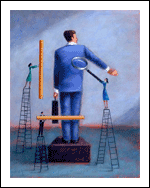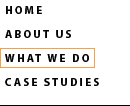| Evaluating Leadership Effectiveness There are times when a manager shows extraordinary potential but needs to develop a greater leadership capacity. The question is not whether these individuals can do the job, but how well they can lead the organization and execute the corporate directives.  Samuel R. James and Associates helps organizations evaluate their managers' abilities to be leaders by focusing on the core values and underlying factors that drive or inhibit their behavior. These are the variables critical to individual and organizational effectiveness. We conduct in-depth consultations with potential leaders, utilizing one of the appropriate Life Styles Inventory™ assessments, to see how they rank compared to their peers and other members in the organization with whom they will need to interact. Specifically, we address the following areas: Leadership Capability – Is their leadership capability natural or do they need additional training to understand the role of the leader? How much of a team player are they? Do they work easily with others and maximize their contributions? Information Processing – Are they oriented to being creative or hands on? Do they have a balance between good personal relationships and an ability to be task-oriented? Are they good at making dynamic decisions or do they make spontaneous, ill-founded ones? Do they face difficult decisions head-on or avoid them? Time Management – Can they set realistic goals and manage resources appropriately in order to achieve results? Do they balance their focus on the strategic with the hands-on, day-to-day responsibilities? Can they separate the primary from the secondary goals and act on the former? Achievement Ability – Can they balance task and people issues? Do they have a strong enough sense of self that they can withstand challenges, change, or failures without becoming defensive? Thinking Styles – Are they open and receptive to other people's ideas? Are they capable of listening to opinions that are different from their own? In the end, leaders must understand the company's strategic plan and establish an organization that can efficiently deliver on its goals. They must be able to develop a style of involvement that builds a constructive culture. By weaving strategy, structure and style into one cohesive process, they can create effective business units where the whole is greater than the sum of its parts. Our evaluation and intervention helps these managers see their ability to achieve this end-state while promoting self-awareness and clarifying the problems and opportunities that lie in front of them as professionals. |
 |
 |
| © 2004 Samuel R. James and Associates. All Rights Reserved. All trademarks, registered trademarks or service marks are the property of Human Synergistics. |

[PDF Version] |
